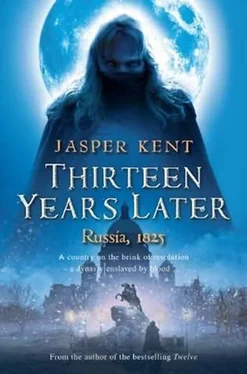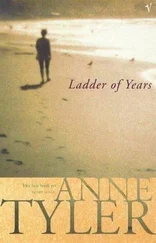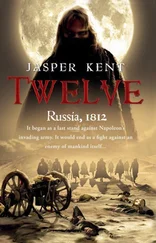Aleksei turned over on to his front and raised himself to his feet. He began to run across the ice, towards Vasilevskiy Island and – perhaps – freedom.
Nikolai’s loyal troops ran after him in close pursuit.
Aleksei remained imprisoned in the Peter and Paul Fortress for seven months. He’d made it across the river, but there were troops already waiting on the other side, rounding up the fleeing rebels. Aleksei opted for arrest rather than a bullet.
Prince Volkonsky – Pyotr Mihailovich – had been his most frequent visitor and greatest supporter, but there was nothing he could do to get Aleksei off the hook. He’d been a favourite more of Aleksandr than of Nikolai, and any sway he might have had was reduced by the involvement of the other Prince Volkonsky – his brother-in-law, Sergei Grigorovich – in the plot itself, which had taken on the appellation of the ‘Decembrist Uprising’. Even if none of that had been the case, there was little hope for Aleksei; he had infiltrated the movement too well. His name – in his own hand – was on the list in Nikolai’s possession, many of the rebels could identify him personally, and he had fled arrest from the tsar himself at the Winter Palace. Any defence would risk the true story of what had happened in Taganrog coming out, and exposing Dmitry as one of the plotters. Neither was worth Aleksei’s freedom. They tortured him, but they were amateurs compared with what Aleksei had experienced. Other prisoners did not stand it so well; Colonel Bulatov, so the grapevine had it, had committed suicide – by cracking his skull open against the wall of his cell.
The greater help that Volkonsky could offer was the promise that he would ensure the financial security of Aleksei’s family – both his families – and the spiritual security of the Romanovs. Aleksei did not know whether his trial would lead to death, prison or exile, but there was a strong likelihood he would not be in a position to do anything useful when Aleksandr Nikolayevich came of age. He told Volkonsky that Cain was now a vampire, and told him all his aliases – all those he knew.
The thaw came as usual in spring and the ice on the Neva melted. Hundreds of corpses began to be washed up on the riverbanks, of both rebels and bystanders, but there was no sign of Iuda. Volkonsky argued that the corpse could well have floated out into the sea and sunk to the bottom, or could have been misidentified – easy in the case of a man with so many names – but Aleksei knew that, like Christ, like Caesar’s dynasty, Iuda had required his own death in order to rise again and become the thing that in his heart he had always been: a vampire.
Letters from Dmitry and Marfa made no mention of Vasiliy Denisovich, either in terms of his disappearance or his continued presence, but to discuss him would be to kick Aleksei while he was down.
On 13 July 1826, the sentences were carried out. There were 289 convicted. Suspiciously, 290 of those who had gone on trial were acquitted. It seemed that Nikolai was being mathematically precise in his demonstration of erring on the side of leniency. Many of the men had taken part in a revolt in the south, some weeks after the events in Senate Square. It had been better organized and better supported, but so far away from the seat of power it had meant nothing, and the strength of Nikolai’s loyal armies had proved the greater.
It was three in the morning when they began to be led out of the dingy cells – still damp from the floods of two years before. Whereas at the time of the uprising there had only been six hours of daylight, now there were only the same of darkness. It was a bright morning twilight that Aleksei and the others emerged into, though the full moon still hung in the air. At least he would have the satisfaction that Iuda could not be there to witness his undoing.
Aleksei stood stiffly to attention as the insignia were ripped from his uniform. There were so many prisoners they had to queue, but none was allowed to see what was happening to the man in front of him. Aleksei had been proud to be made a colonel, and many people now long dead – his father, his mother, Vadim Fyodorovich – would have been proud of him too. But if they were now in a position to know he had become a colonel, and to know that he had been stripped of that rank, then they must also know the reasons behind it; he felt no shame.
He was moved on and next instructed to remove what was left of his uniform and change into a simple peasant robe, but then, strangely, he was issued with a sword. It was not his own, but he could guess the symbolism that led to its being issued to him. He was brought out into the early sunlight. It had been raining overnight, but it was clear now, though the ground was still damp. In front of Aleksei stood five gallows, empty for the time being, and beside them a raging fire.
The sword he had just been given was taken from him. The officer who had taken it raised it above Aleksei’s head, holding its handle and its tip, and began to bend it. This was the symbolic degradation that was applied to a traitor. Aleksei himself had once before been on the other end of the ceremony, when he had held Maksim Sergeivich’s sword above his head and snapped it in two. Then he had believed Maks to be a traitor and Maks had known that, ultimately, his treason was justified. Aleksei could not feel sorry for himself. There were people alive who knew what Aleksei had done – not many, but enough. He would die in the knowledge that somewhere out there, those that he cared for most still loved him. Maks had only regained that love after he had died, and for him that was too late. He remembered Maks’ tearful eyes as the sword shattered, and the surrounding circle of voordalaki, with Iuda gloating as he looked on.
The sound of the sword breaking – that same metallic scream, which he had not heard for thirteen years – awoke him from his thoughts. The two halves of the blade were thrown on to the fire to melt, and Aleksei was led to a group of his fellow traitors who stood and waited before the gallows. That was the worst affront of all. Russia did not sanction capital punishment, not for the last three quarters of a century. It seemed that Nikolai, like his brother before him, had plans to modify the constitution. Once all the officers – now officers no more – had gone through the process of degradation, the hangings began.
The names of the five ringleaders were read out and they were led up to the gallows; Pestel, Muriev-Apostol, Ryleev, Bestuzhev-Riumin and the murderous Kakhovsky. Each man climbed the ladder and had a noose placed around his neck and tightened. The hangman struggled with the ropes, wet from the overnight rain, but eventually all five men were ready. They were kicked away from the ladders.
A groan was uttered in unison from the watching crowd and heads were turned away. Three of the men slipped from the ropes and landed on the ground below; Muriev-Apostol, Ryleev and Kakhovsky. While the other two men kicked at the air with ever decreasing vigour, the process began again for the ‘lucky’ three. This time there was no mistake. In Aleksei’s mind, only Kakhovsky deserved it.
Another list of names was read out – around thirty in all – Aleksei’s amongst them. Then the sentence was declared. It was not to be hanging. Aleksei could not tell whether he was relieved. To die would have made a quick end of it, but life meant hope, and Aleksei was in need of hope.
A few hours later he was led, in amongst a small group, out of the Neva gate of the fortress and along the short, stone pier to a waiting barge. He looked across the broad, flowing river at Saint Petersburg. He could see the Winter Palace, and a little of the Admiralty, but Senate Square and the statue of Pyotr were out of sight. He stepped down into the boat and within minutes it pushed off, taking him, and his fellow rebels, to a new life, from which there would be no return: a life of exile.
Читать дальше












